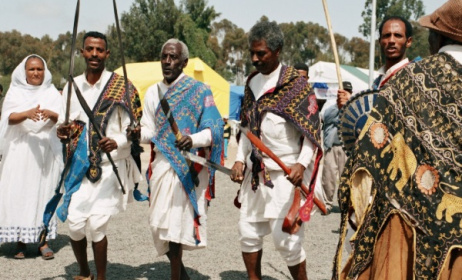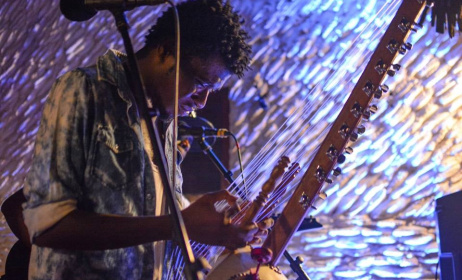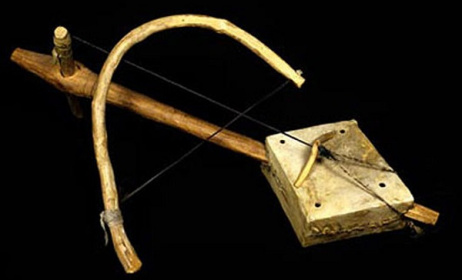A custodian of Xhosa culture - and proud of it
South African praise singer Jessica Mbangeni is a contemporary voice with a proud oral tradition that is as ancient as the rolling hills of Nqamakwe in the Eastern Cape where she was raised.
 South African praise singer Jessica Mbangeni. Photo: Facebook
South African praise singer Jessica Mbangeni. Photo: Facebook
Mbangeni occupies a unique place in South Africa as the only high-profile female imbongi (praise poet) – a role that is traditionally reserved for men in patriarchal African societies like those of the Xhosa people.
In African oral tradition, it’s the praise poet who reminds his people about their history and heritage. He’s a living archive with a remarkably retentive memory who is expected to recall royal lineages, praise names and the nation’s defining moments. The imbongi is also a village bard with a profound role in African society – that of articulating the mood of the community and capturing these collective sentiments in crisp poetic lines.
A close comparison would be with the griots of West Africa – specifically francophone countries such as Burkina Faso, Guinea, Ivory Coast, Mali and Senegal. Once upon a time during the Middle Ages, these countries were part of the great Malian empires ruled by the Mandingo royal families – from the great Sundjata Keita in the 12th century to Almamy Samory Toure of the 1800s. Traditionally, a griot develops his memory skills from a young age in order to master the immense amount of knowledge and oration that is the basis of the Mandingo culture.
By definition, the griot is a professional musician who praises royalty and tells stories of his nation. In both traditions, the griot and the imbongi extol the courageous deeds of heroes, criticise those who have gone astray, including rulers, and give people hope during trying times while encouraging them to work hard towards the creation of a better society with a strong moral fibre and sound cultural practices.
Among the Xhosa people in particular, the praise singer’s craft has a healing effect on the listener who is emotionally wounded. This is a gift he shares with other traditional practitioners such as diviners, herbalists, iimvumi (singers), abaxhentsi (dancers) and abazobi (painters). They all possess deep-rooted spirituality that comes from the ancients.
In post-apartheid South Africa, the praise poet has assumed an enviable role as the artist who does not only recite the first citizen’s lineage during august occasions like the opening of parliament, but also one who occasionally accompanies him to high-profile international engagements. Nelson Mandela’s praise poet, Zolani Mkiva, is a celebrated example.
Mbangeni’s highlights have included performing during the second presidential inauguration of Thabo Mbeki in 2004 as a member of the Soweto Gospel Choir. Joining the Grammy Award-winning vocal powerhouse in 2002 marked the beginning of her eventful journey as a professional imbongi, recording artist and cultural ambassador. The choir played a significant role in opening her eyes to the rest of the world and taught her what it meant to be a professional singer. Tours with the Soweto Gospel Choir included Australia and New Zealand as well as performing in 37 American cities in 2005 alone. By then, she had established herself as one of the choir’s leading singers and was confident that it was just a matter of time before she could launch a solo career.
On and off stage, Mbangeni has developed a persona of a proud Xhosa woman resplendent in colourful traditional wear. Even before she opens her mouth, her clothes announce to the world her proud ethnic identity and heritage. She is undoubtedly a custodian of Xhosa culture. “It’s only when our culture is respected that we can realise our dignity as a people,” she says. “The new dispensation demands that the identity of African people in all its diversity is given respect by the descendants of those who colonised us.”
Mbangeni’s debut album, Igoli (2013), is an artistic affirmation of her cultural roots. Her second offering, Busisiwe: Tribute to the African Heroines (2015), powerfully evokes the spirit of Busi Mhlongo, an incredible vocalist who belted out profoundly spiritual songs. Its launch last month was symbolic of the strong African identity that Mbangeni expresses in her music, garments and everyday life.
“This is the month that marks the first fruits ceremony,” she explains. “My grandmother would be the one responsible for bringing the harvest of crops and vegetables from the garden so that we could taste. That was done to honour the ancestors and to ask for blessings for the whole year.” Mama – Ekugqibeleni, the fourth track on the album, is dedicated to her grandmother, a remarkable storyteller who fused her craft with Xhosa folk songs.
“She played an influential role in my calling as a poet and singer,” she recalls. “But strangely enough, initially I never imagined myself in this role. However, one day I was comforting my then 2-year-old boy when I started reciting a poem. I didn’t know where it came from. I believe it was from a higher power – an ancient muse of poetry – and was meant as a lullaby for the child. But that moment marked the beginning of my role as a praise singer.”
When the muse occupies her being, she says she is transported to another realm which inspires her to write and recite verses in her native language but including deep Xhosa words and phrases that she doesn’t use in everyday conversation. Songs such as 'Amarhatya', 'Mjong’emini' and 'Qula Kwedini' are Xhosa folk songs but her arrangements have given them a new life and essence. 'Molo Fish' extols the natural beauty of African people and their proud traditions. In the song 'Wandishiya Ndindodwa', she laments the fact that she was abandoned with a child by a boyfriend, but she thanks the ancients for the moral support and blessings they have showered her with.
“This album reflects on the past. It pays homage to those who have paved the way for us young musicians, who unfortunately they didn’t enjoy the fruits of their groundbreaking artistic endeavours,” she says.
The album also salutes unsung heroines like Nosekeni Mandela, the late former president’s mother, and Nonsizi Mgqwetho, one of the few female Xhosa praise poets, as well as Yvonne Kgame, her mentor.
Produced by virtuoso guitarist Lawrence Matshiza – in her own words “the living treasure of our times” – this beautiful album has an impressive line-up of some of the finest instrumentalists in the country – Nduduzo Makhathini (keyboards), Lucas Senyatso (bass guitar), Max Vidima (lead guitar), Nongoma (acoustic guitar), Rob Watson (drums), McCoy Mrubata (alto sax and flute), Sydney Mavundla (trumpet), Jabu Magubane (trombone), Gari Gong (percussion) and Matshiza on guitar. Backing vocalists Khanyo Maphumulo, Reuben Malgas, Khanya Ceza, Nqobile Sibeko, Dumza Maswana and Bheki Nene complement this illustrious line-up.
“I have been through tough times, but I feel blessed. My secret to lasting happiness is being polite to everyone. Such an attitude helps me to heal and progress in life,” she concludes.
From 11 to 13 March 2016, Mbangeni will perform for 3.5 million people during the World Culture Festival in New Delhi, India. Immediately thereafter, she will fly to the US for the South By South West (SXSW) festival in Austin, Texas, and Atlanta, Georgia. The performances will take place from 14 to 20 March.
* Originally published on 28 January 2016 in the African Independent.

































Comments
Log in or register to post comments